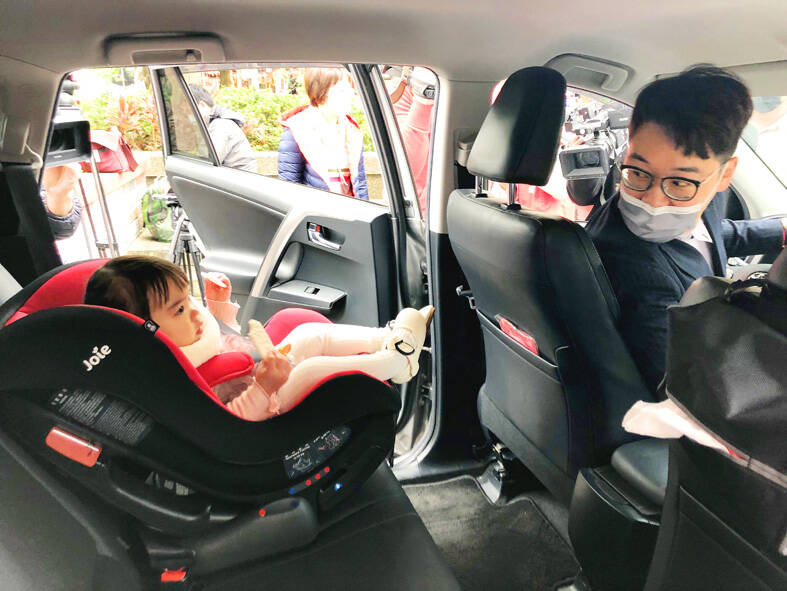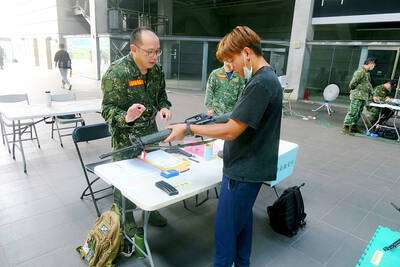Parents should never leave young children alone at home or in a car locked from the outside, putting them at serious risk in case of an emergency, a child welfare group said.
The Jing Chuan Child Safety Foundation said that such incidents tend to rise during the Lunar New Year holiday, when children are home from school or daycare, or when families spend more time on the road.
This year’s Lunar New Year holiday runs from Friday to Sunday next week.

Photo: Rachel Lin, Taipei Times
The number of children left a home or locked in cars in Taiwan increased 4.1 times over the past year compared with the year before, the group said.
Statistics from the US National Safety Council showed that an average of 38 children under the age of 15 die in the US every year from being locked in vehicles, foundation chief executive officer Lin Yueh-chin (林月琴) said.
“We found that in many cases, children accidentally got locked in the car when parents left their keys in the ignition before taking the child out of the car seat,” she said.
“In other cases, children get locked in homes when parents step out without the key and the door locks behind them, or they misplace keys before returning home,” she said, urging parents to exercise caution.
Last year in Taiwan, 29 children were injured after being locked in a home or a vehicle — 4.1 times greater than the seven children injured in such incidents in 2021, she said.
Two of the dangers of locking a child in a car is the lack of oxygen when the windows are rolled up, which leads to suffocation, and the buildup of heat inside the car in summer, which leads to heatstroke, she said.
Citing an example, Lin said that a three-year-old girl died of heatstroke leading to cardiopulmonary arrest in Japan in September last year, after she was left in a childcare facility bus for three hours.
In a case in Taiwan, a man stepped outside his apartment to take the garbage out, leaving his daughter in the apartment. When he returned to his apartment he saw that the door — which automatically locks — had blown shut, and his keys were inside, she said.
“Always make sure your keys are with you when you step out of your car or home leaving your child inside, even for just a moment,” she said.

A magnitude 6.4 earthquake struck off the coast of Hualien County in eastern Taiwan at 7pm yesterday, the Central Weather Administration (CWA) said. The epicenter of the temblor was at sea, about 69.9km south of Hualien County Hall, at a depth of 30.9km, it said. There were no immediate reports of damage resulting from the quake. The earthquake’s intensity, which gauges the actual effect of a temblor, was highest in Taitung County’s Changbin Township (長濱), where it measured 5 on Taiwan’s seven-tier intensity scale. The quake also measured an intensity of 4 in Hualien, Nantou, Chiayi, Yunlin, Changhua and Miaoli counties, as well as

Credit departments of farmers’ and fishers’ associations blocked a total of more than NT$180 million (US$6.01 million) from being lost to scams last year, National Police Agency (NPA) data showed. The Agricultural Finance Agency (AFA) said last week that staff of farmers’ and fishers’ associations’ credit departments are required to implement fraud prevention measures when they serve clients at the counter. They would ask clients about personal financial management activities whenever they suspect there might be a fraud situation, and would immediately report the incident to local authorities, which would send police officers to the site to help, it said. NPA data showed

ENERGY RESILIENCE: Although Alaska is open for investments, Taiwan is sourcing its gas from the Middle East, and the sea routes carry risks, Ho Cheng-hui said US government officials’ high-profile reception of a Taiwanese representative at the Alaska Sustainable Energy Conference indicated the emergence of an Indo-Pacific energy resilience alliance, an academic said. Presidential Office Secretary-General Pan Men-an (潘孟安) attended the conference in Alaska on Thursday last week at the invitation of the US government. Pan visited oil and gas facilities with senior US officials, including US Secretary of the Interior Doug Burgum, US Secretary of Energy Chris Wright, Alaska Governor Mike Dunleavy and US Senator Daniel Sullivan. Pan attending the conference on behalf of President William Lai (賴清德) shows a significant elevation in diplomatic representation,

The Taipei City Reserve Command yesterday initiated its first-ever 14-day recall of some of the city’s civilian service reservists, who are to undergo additional training on top of refresher courses. The command said that it rented sites in Neihu District (內湖), including the Taipei Tennis Center, for the duration of the camp to optimize tactical positioning and accommodate the size of the battalion of reservists. A battalion is made up of four companies of more than 200 reservists each, it said. Aside from shooting drills at a range in New Taipei City’s Linkou District (林口), the remainder of the training would be at